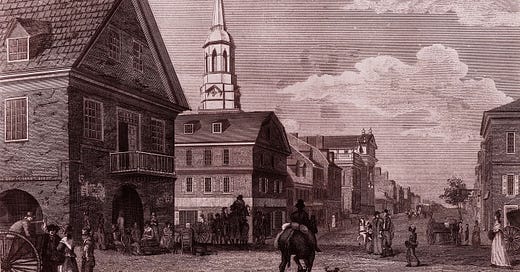Christianity and the Founding Fathers
The most significant influences on the Founding Fathers were an array of collectively expressed objective moral truths, spurring from personal accountability to their Creator. While not all Founding Fathers actively practiced their Christian faith, it was their belief and understanding that there existed a Supernatural eternal force responsible for the creation of the planet and everything that is known, including our free will. These inherent principles, alongside their personal upbringings, and the faith of the first Puritan settlements; were responsible for drafting the first charters, orders, and common laws; all based on oaths and covenants.
The Bible featured the earliest use of the word “covenant;” when God established a covenant with Noah, before destroying the rest of humanity through the great flood, (Genesis 6:17-18). Noah’s covenant serves as the standard by which all others were modeled; charters soon followed, representing the compilation of what America’s Founders believed to be the best practice of governance. Citizens from various forms of rule came together to propose the best interests of working systems they had experienced, from a civil perspective. These numerous written covenants and charters from foreign recognized a Supernatural force responsible for granting divine providence to rulers while offering the Founders evidence to what worked, discarding what did not. The Magna Charta of 1215, Latin for “the Great Charter,” is described by Historian James McClellan as, “the foundation of Anglo-American liberties…it established the principle that all Englishmen, not just the Lords, are entitled to personal liberty,” adding that in this charter “no man, including the King himself, is above the law,” (McClellan, J., 23).
From these Charters came the formation of the single document Constitution responsible for the United States of America. The Constitution featured a compilation of the laws that best represented the interests of the people, but guaranteed those rights to each citizen, for the first time in the history of governance; these exceptional qualities are what have been responsible for it ascending to become the greatest and most sought-after nation on the planet. What the Founding Fathers were determined to reject from our U.S. Constitution was the tyranny and oppression that led to the revolutionary formation of America. Biblically, Jesus Christ acknowledges those persecuted for their faith and worship of the Lord, calling them “blessed,” (Mark 5:10). The Founders incorporated the requisite that all citizens bear the right to place God’s will first, above that of government. Author Mark David Hall reveals that “The unamended Constitution contains three oath requirements, and most founders could not conceive of oaths in anything other than religious terms ,” (Hall, M.D., 25). America’s first Oaths, Covenants, and recognition of inherent Human Rights, were all rooted in Christian doctrine; and transposed into the legislation responsible for our individual liberties and resilient nation.
Historian David Barton describes “[o]n September 6, 1774, the pastor of this church, the Rev. Jacob Duché, came to Carpenters’ Hall to open the first American Congress with prayer (Barton, D. 59). Barton adds that, “of the fifty-six Founding Fathers who signed the Declaration in Independence Hall in 1776, over half had received degrees from schools that today would be considered seminaries or Bible schools (Barton, D. 95). America was not founded to be a Christian nation. Historian George H. Nash writes in the forward of Mark David Hall’s “Did America Have a Christian Founding?,” that, “[t]he American republic was not founded in 1787 as a unitary, confessional, Christian state. But it was founded within the context of an overwhelmingly Christian population, and nearly all the Founders adhered to, or were influenced by, Christian moral teachings and practices.”
The specific philosophical and theological influences that shaped the Founding Father’s specific views on government occurred by proxy. The Founders ensured that they would not constrict the liberties of all men by their own dependencies, as experienced in their native motherland. America instead, would function as a representation of God’s image. The awareness of a Creator does not require the active practice of religion, nor does it require denominational allegiance. The Founders knew that the Biblical doctrine required personal accountability to God; a covenant between man and his Creator. Further, Mark David Hall describes Article VII of the Constitution that concludes with “in the year of our Lord,” writing, “if America’s founders desired to create a thoroughly secular political order, they might have avoided the convention ‘in the year of our Lord’ altogether,” (Hall, M.D., i) This fact cannot be averted, inferring that America is not a Godless nation, nor was it ever intended to be; God’s order remains a central focus in the judgment and law of man to this day, despite modern demagogues, pseudo-intellectuals, and politically-appointed bureaucrats eager to take the credit.
Conclusion
The Founders ensured to create a nation that promised liberties to all men and women regardless of their interests, so long as they do not infringe on another’s citizens; this task was something that had never been done in history, and required trials and errors through centuries of data, summarized by the prosperity and longevity of pre-existing nations. America was built on a solid foundation of faith, taking into account the Divine Providence of God, despite the active practice of religion. The Protestant Christian Reformation’s influence remains apparent in the U.S. Constitution, acknowledging that each individual holds a right to a personal covenant with God, so long as it does not distort Biblical Doctrine. God made man in His image, Constitutional self-sovereignty originated in Genesis, and remains fundamentally identifiable in the modern political landscape.
Bibliography
Barton, David. 1993, 2011. America’s Godly Heritage. Wallbuilders. Kindle Edition.
Genesis 6:17-18 (NASB) “Behold, I, even I am bringing the flood of water upon the earth, to destroy all flesh in which is the breath of life, from under heaven; everything that is on the earth shall perish. But I will establish My covenant with you; and you shall enter the ark—you and your sons and your wife, and your sons’ wives with you.”
Hall, Mark David. Did America Have a Christian Founding?. Thomas Nelson. Kindle Edition.
Matthew 5:10 (NASB) “Blessed are those who have been persecuted for the sake of righteousness, for theirs is the kingdom of heaven.
McClellan, James. (1989, 1991, 2000). Liberty, Order, and Justice: An Introduction to the Constitutional Principles of American Government. Liberty Fund: Indianapolis, Indiana.




